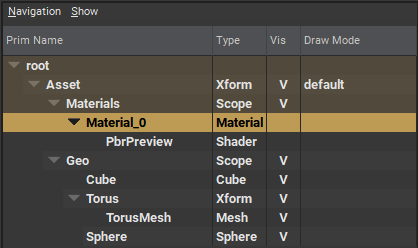IsA (Typed) Schema
“Is A prim this”-kind of schema. Essentially the schema definition that defines the “type” of prim.
In the image above, the Type column lists which IsA Schema the prim subscribes to.
When looking at the USD “code”, the keyword between def and the name of the prim signifies which IsA Schema the prim should subscribe to.
def Xform "MyTransform" {} # MyTransform subscribes to the Xform IsA Schema
def Cube "MyCube" {} # MyCube subscribes to the Cube IsA Schema
def "EmptySpec" {} # EmptySpec is a valid prim, it simply has no default set of properties attached to it. It could literally be anything.
Prims cannot subscribe to more than 1 IsA schema!
IsA Schema Example -> UsdGeomCube
In the example below you can see the schema definition for our favorite Cube. It defines that Cube inherits from Gprim (a base for all drawable prims), metadata for the type (like documentation string) and two attributes. size and extent.
class Cube "Cube" (
inherits = </Gprim>
doc = """Defines a primitive rectilinear cube centered at the origin.
The fallback values for Cube, Sphere, Cone, and Cylinder are set so that
they all pack into the same volume/bounds."""
customData = {
dictionary extraPlugInfo = {
bool implementsComputeExtent = true
}
}
) {
double size = 2.0 (
doc = """Indicates the length of each edge of the cube. If you
author \\em size you must also author \\em extent.
\\sa GetExtentAttr()"""
)
float3[] extent = [(-1.0, -1.0, -1.0), (1.0, 1.0, 1.0)] (
doc = """Extent is re-defined on Cube only to provide a fallback value.
\\sa UsdGeomGprim::GetExtentAttr()."""
)
}
Creating new prim types can be as easy as the above, or as complex as defining an entire Mesh.
